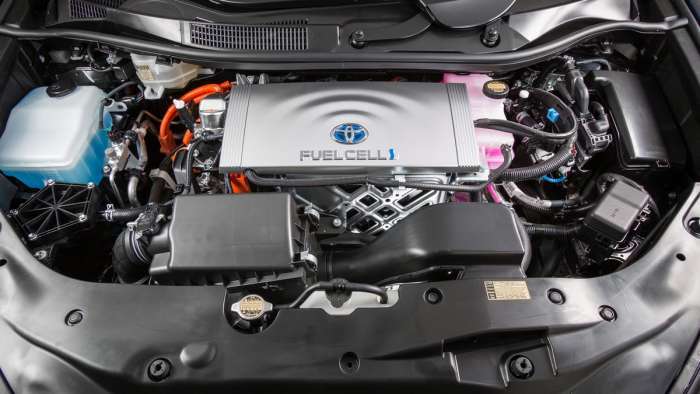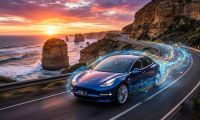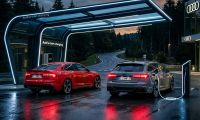Toyota has proven they are industry disruptors. The Prius is a great example of what Toyota has actively done to give our future a fighting chance.
Elon Musk has also been an industry disruptor as well. Fighting and giving up everything imaginable to get where Tesla Motors is today.
Both companies suffer from the same thing, and that is charging these cars and where. Tesla has its own electronic superhighway that dominates the American landscape. Giving Tesla Motors, a huge lead when it comes to building an empire around electric cars. The only downside is, you can only charge a Tesla, at a Tesla station.
So what if you could charge a Tesla at a Toyota Station what would that look like? The answer is closer than you think. Toyota Fuel Cell Technology is not just for cars, it is for supplying electrical power, which in turn can charge your Prius Prime, Tesla, or whatever flavor of EV you choose. Here is how they are doing it.
Toyota Hydrogen Fuel Cell Stacks
Originally developed for the Mirai, Toyota fuel cells were to be the technology of the future. Mirai literally means Future in Japanese. Toyota had envisioned this technology back in 1992, but just like Howard Stark, they were also limited by the technology of the time to really get this going.
During the birth of Prius and before, Toyota never gave up on the idea that Fuel Cells were a way to get us to cleaner and sustainable energy while minimizing the impact we have on the earth. Toyota Motor Corporation in Japan developed and built components called fuel cell stacks that turned hydrogen into electricity and then into water.

They do this by taking in compressed hydrogen, splitting the atom through a PEM cell and sending the electron through a circuit only to bond it on the other side with oxygen. This action creates electricity and can be readily used on demand.
The idea behind this is incredible. With hydrogen being the most abundant element on the planet, this looked like no brainer. But the fuel cell stacks were not without lots of failed trials and many refinements to get them to where they are today.
Toyota Motor North America has also scrapped the research part of the program and has adopted the Mirai into mainstream production. Under limited numbers of course.
What These Stations Mean For Prius,Tesla And All EV Owners
These stations are meant to be power stations that can provide power to buildings well as be places for electric cars to charge. Better yet, they are actual zero emissions power supplies, depending on where the hydrogen comes from.
Currently, there is not a good clean "green" method to getting hydrogen which is what is really holding it back. The major source right now is reforming natural gas and stripping the hydrogen away from it. Not exactly helping the technology be as green as it could be.
Hydrogen could be renewable if we could mass produce it in a cost effective way, there would be nothing really holding the technology back from moving us in a great direction for sustainable energy.
So far the closest thing that Toyota can do to get further along the efficiency road is adding solar panels. While this is a step in a good direction for cars like the Prius Prime, it is not where we could be.
Conclusion
While Hydrogen fuel cell tech is a great idea, unless Toyota and/or any other company can figure out cheap hydrogen manufacturing, we are going to be left chasing the perfect hybrid and electric vehicle.
Thanks for reading, See you in a Prius story where I am discussing why Carista is the best $20 tool for your Toyota Prius.
Check out my other article out where https://www.torquenews.com/8113/3-reasons-toyota-should-bring-back-prius-v-awd-e.
Also Watch New tech means more MPG from your Toyota Prius and Click to Subscribe to Torque News Youtube Channel for Daily Toyota Prius and Automotive News.
Peter Neilson is an automotive consultant specializing in electric cars and hybrid battery technologies. He is an automotive technology instructor at Columbia Basin College. He holds a Bachelor of Science in Automotive Service Technology from Weber State University. Peter is also an Adjunct Instructor of automotive technology at Columbia Basin College. Peter can be reached on Linkedin and you can tweet him at The_hybrid_guy on Twitter.
Set Torque News as Preferred Source on Google












Comments
I am a big fan of hydrogen as
Permalink
I am a big fan of hydrogen as a fuel. But I have to say that it will not become more than an experiment until/unless they can provide the fuel cheaply and everywhere. As of today it is expensive and there are only a tiny handful of stations in California, and a couple more scattered across the whole country. In contrast, almost everyone has an electrical supply at home, and the cost of driving an electrical car is cheaper than the most frugal gasoline powered car. Yet EVs have a battle to gain more than 3-4% of the new car market, with FCEVs (fuel cell EVs) being a fraction of that market. First off, I think that FCEVs should be offered as plug-in hybrids, with at least 100 miles battery range, and maybe 200-300 more miles of FCEV range.
Yes I think we need a company
Permalink
Yes I think we need a company like hypersolar which NO ONE seems to know about
water and sun POS for H2
What a BS article! Why would
Permalink
Why would anyone produce hydrogen and convert it back into electricity? Why not just use electricity straight out of the power grid? If only Toyota found a way to produce hydrogen cheaply! If only men had wings and could fly! Wouldn't this be amazing?
Fuel cells don't "split
Permalink
Fuel cells don't "split hydrogen atoms". They provide a controlled reaction of hydrogen with oxygen to release water and produce electricity. "Splitting atoms" implies nuclear reactions.
You can charge a Tesla at any
Permalink
You can charge a Tesla at any other charging station, you can’t charge anything but a Tesla at a supercharger.
Hydrogen as a storage mechanism for passenger vehicles immensely idiotic. The energy cycle is so inefficient it makes a pedal car look good. Then there’s the costs. Costs for a refueling station installation is orders of magnitude more than a battery charging station. Then there’s the costs of the fuel itself. But apart from that most hydrogen is cracked from methane and therefore in no way carbon neutral at production…. So what is the actual point?
The push for hydrogen is purely a stalling tactic of the fossil fuel industry, hydrogen fuel cell vehicles have been 5 to 10 years away for the last 40years.